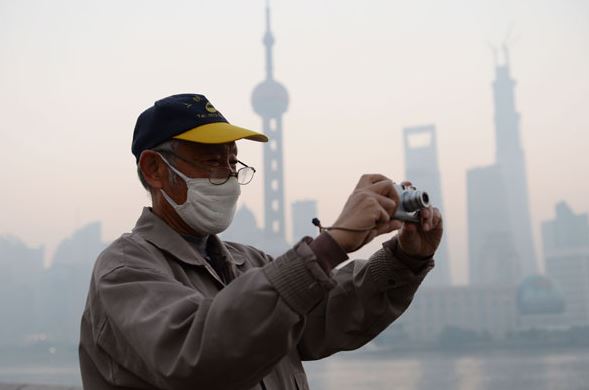


(Photo: China Daily)
Some taxis in Shanghai and Jinan, Shandong province, are now able to collect data regarding air quality thanks to a new technology developed by a research team of Shanghai's Tongji University.
Data related to pollutants like PM2.5 – particulate matter with a diameter of 2.5 mm or less – can now be collected by a detector installed in taxi top light boxes which shelter the device from severe weather conditions, Tan Hongwei, team leader and deputy director of the Research Center of Green Building and New Energy at Tongji, was quoted as saying in a report by Eastday.com on Jan 16.
The idea of building an air quality monitoring network, covering unmanned aerial vehicles, cars and fixed devices was proposed by Tan in 2015. It was later supported by the research team at Shandong University which specializes in laser sensors.
"PM2.5 air quality monitors are conventionally installed at limited and fixed locations, like rooftops or places far away from places with human activity," said Tan. "However, car detectors can sense the PM2.5 pollution right where there is human activity, making the data more practical. We hope these PM2.5 air quality detectors will be further applied nationwide."
According to Tongji University, the first batch of 30 taxis have been put into use in Shanghai at the end of 2017. Each taxi recorded about 27,000 pieces of data a day, with the combined data reflecting the air conditions in 98 percent of the city.
These figures will support supervision, management and policy making for the environment, Tan said.
His research team has also created a map that depicts the hourly concentration of ambient PM2.5 in Shanghai.
The map shows that the levels of PM2.5 in urban and rural areas are nearly the same. However, the air quality in the eastern region is better than in the west.
Some people have criticized the project, citing how the monitoring devices are fitted onto vehicles that run on fossil fuels, one of the major contributors to air pollution.
Tan explained that the amount of PM2.5 directly generated by cars is actually decreasing, and that vehicle emissions are just a "catalyst" for pollution and not PM2.5 itself.
 Fire brigade in Shanghai holds group wedding
Fire brigade in Shanghai holds group wedding Tourists enjoy ice sculptures in Datan Town, north China
Tourists enjoy ice sculptures in Datan Town, north China Sunset scenery of Dayan Pagoda in Xi'an
Sunset scenery of Dayan Pagoda in Xi'an Tourists have fun at scenic spot in Nanlong Town, NW China
Tourists have fun at scenic spot in Nanlong Town, NW China Harbin attracts tourists by making best use of ice in winter
Harbin attracts tourists by making best use of ice in winter In pics: FIS Alpine Ski Women's World Cup Slalom
In pics: FIS Alpine Ski Women's World Cup Slalom Black-necked cranes rest at reservoir in Lhunzhub County, Lhasa
Black-necked cranes rest at reservoir in Lhunzhub County, Lhasa China's FAST telescope will be available to foreign scientists in April
China's FAST telescope will be available to foreign scientists in April "She power" plays indispensable role in poverty alleviation
"She power" plays indispensable role in poverty alleviation Top 10 world news events of People's Daily in 2020
Top 10 world news events of People's Daily in 2020 Top 10 China news events of People's Daily in 2020
Top 10 China news events of People's Daily in 2020 Top 10 media buzzwords of 2020
Top 10 media buzzwords of 2020 Year-ender:10 major tourism stories of 2020
Year-ender:10 major tourism stories of 2020 No interference in Venezuelan issues
No interference in Venezuelan issues
 Biz prepares for trade spat
Biz prepares for trade spat
 Broadcasting Continent
Broadcasting Continent Australia wins Chinese CEOs as US loses
Australia wins Chinese CEOs as US loses